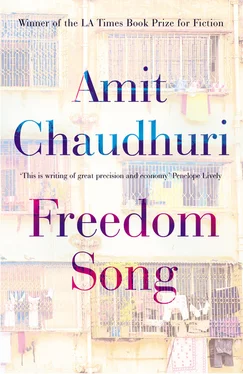Amit Chaudhuri
Freedom Song
It was a solitary voice, saying Allah-hu-akbar and other familiar but incomprehensible syllables. Though it was coming from quite far away, for the nearest mosque was a mile northward, she could hear it clearly, as if it were being recited in this very lane, and its presence filled the grey area between her sleep and waking. The singer, if one could call him such, seemed absolutely absorbed, wherever he was, in the unearthly lift of the melody, in his indecision between repetition and progression, and in the delicate business of now prolonging and now shortening a syllable. The city was still — the trams, the trees whose leaves were covered with a film of dust, the junctions, Lower Circular and Lansdowne roads, the three-storeyed houses on Southern Avenue, the ten-storeyed buildings on Ballygunge Circular Road. Soon that machinery would start working again, not out of any sense of purpose, but like a watch that is wound daily by someone’s hand. Almost without any choice in the matter, people would embark upon the minute frustrations and satisfactions of their lives. It was in this moment of postponement that the azaan was heard, neither announcing the day nor keeping it a secret.
She got up, as she had been getting up for fifty years, ever since she was fifteen years old and became serious about her singing, going out into the drawing room in the house in Shillong to practise, so as not to wake up her sleeping brothers or suffer their cheerful mockery. The morning today was almost as cold as the mornings in Shillong used to be; she was slower now, her hips wider, as those of a woman who has borne children are said to be, and, at this moment, a little unsteady on her feet. Solemnly, she put a shawl around herself and disappeared into the darkness of the bathroom, as if she had a rendezvous there, and, ten minutes later, emerged again. Her husband was asleep, his outlines barely distinguishable from the quilt. Her own quilt had become a bunched-up, higgledy-piggledy mess, and seemed to have a small child hiding underneath it.
When she came out of her room, she found the door to the guest room open. The curtains had been parted, and the single bed already made. As she was looking around, the knob on the bathroom door turned and Mini came out, her spectacles misted, patches of wet on her blouse and petticoat. She had always been a clumsy girl. The bathroom, whose window faced east, was flooded with light.
‘What, Khuku!’ she said with great surprise. ‘You’re up already?’ Then, a note of both respect and affection entering her voice, she said, half to herself, ‘Shib must be asleep.’
‘I was woken by the azaan,’ complained Khuku. ‘And, believe me, Mini, I had no sleep last night, I began to think about Bablu and I lay wide awake with my head feeling hot.’
‘Really!’ said Mini, feeling outraged on her behalf, and seeming to speak of a group of absolutely tiresome schoolchildren (for she was a schoolteacher), ‘They are going too far! And,’ she said, ‘it isn’t really Indian, it sounds like Bedouins.’ With a look of satisfaction on having said this, she began to comb her hair, which was wavy, not very long, and still all black. Then, hobbling towards the dressing-table, she stood opposite her reflection, exactly as dark and stocky as herself, and began to sort out, with both hands, the folds of a white sari with a green border, tucking it in first into the petticoat that had been tied not only above stomach-level, but almost approaching the chest; chin lowered, she drew the layers of the sari around herself till she was almost completely ensconced in it. ‘Bas!’ she said when it was done. ‘Now we can go outside.’ But Khuku had already slipped out silently to the hall and was telling Nando to get up.
‘Get up, you lazy man!’ she commanded him. ‘Give us tea!’
Nando went on sleeping. She went around the hall aimlessly, like an insect exploring a window-pane, and then entered the room her son stayed in when he came back from America; the beds were perfectly made, all his books were standing on the shelves, and in the cupboards lay piled his old comic books and Tintins, and a pair of sandals. She pulled back the curtains which were drawn at night for no particular reason by Jochna before she went home. Meanwhile, Mini had settled into an arm-chair in the hall, and was already studying a very funny book by Bonophul, peering hard at the print through her glasses. As if out of some vestigial survival of embarrassment, Nando rose from the carpet, dragging his blanket behind him, a dark four-foot-ten-inch demon, and walked dolefully towards the kitchen.
Khuku sat down on the arm-chair next to Mini, who closed her book and looked up.
‘How are you feeling, Mini?’ asked Khuku. ‘Did you sleep well last night?’
‘I’m much better already,’ she said. ‘Your house is so beautiful and comfortable that I have no choice but to feel better!’ She laughed as she always did, her dark brown lips parting to reveal her uneven white teeth, her head and shoulders and chest shaking together. Then, almost immediately, the sides of her eyes crinkled shyly, because she was one of those who had grown up in an age when it was believed that to laugh too hard was not proper for a woman. ‘In fact,’ she said, ‘the moment I’m better I’ll be going back. There will be a lot of school-work this term.’
‘Quiet!’ said Khuku. ‘I can’t ask you something without you talking about going back! Will you let yourself rest for a while?’
‘There is Shantidi,’ murmured Mini.
‘Shantidi is capable of taking care of herself!’ said Khuku. ‘She travels from one end of the city to the other!’
‘She might get into a bad mood. .’ said Mini softly, staring at the carpet.
‘Shantidi,’ said Khuku gently, ‘is very anxious that you get better. She’ll be unhappy if you go back before you are perfectly all right.’
Mini began to laugh again, this time pursing her lips and nodding her head slowly backward and forward. It was not clear why — probably at Khuku’s childish insistence, or probably because she could not picture Shantidi unhappy; a little bad tempered, yes, if she could not find her sandesh mould or a hairpin. Only five days ago, when Khuku had arrived in her Ambassador to pick up Mini from where she and her older sister lived in North Calcutta, in the New Municipal Corporation Building, which was, in fact, twenty-five years old, Shantidi had been away at an acquaintance’s funeral. Three years ago, recovering from hepatitis, she had gone about, somewhat tardily, with a torch and a walking-stick. Now she did not fear even trams and buses, and pushed her way inside and pushed her way outside. When Khuku was helping Mini down the dark stairs towards her car, Shantidi, after expressing her grief to a relative, and saying with all conviction what a wonderful person was the departed, a simple and pure-hearted woman who had never harmed anyone, was eating jilepi and shingara from a paper plate, and talking about her favourite subject, politics. The caterers, in another room, were heating food in drums over open fires, and stirring the hot and bubbling mass with long black khuntis. The dead one had led a long and peaceful life, and how wonderful it was, thought Shantidi to herself, that the eyes of her daughter, who was smilingly welcoming guests, followed everywhere by her small inquisitive son, should still be a little red with weeping.
Now, at six in the morning, in a house on Ishwar Chandra Vidyasagar Road, a very dark twenty-eight-year-old man was hiding, terrified, beneath his blankets. What he was terrified of was not clear, but he had slipped under the blanket as far as he could, and only his frowning eyes, his forehead, and his hair, the shorter ones of which stuck out like rays and stings in every direction, were visible.
Читать дальше












